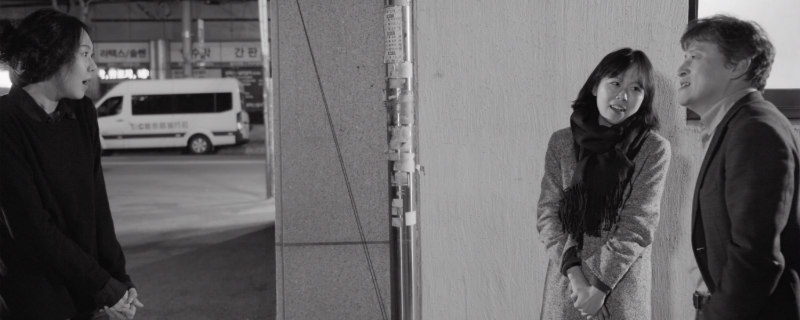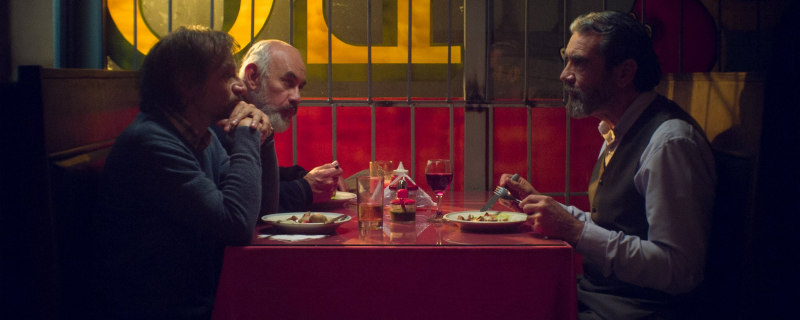
A second batch of reactions to the movies we checked out at this year's fest.
Words by John Bennett
The Cannes Film Festival began on the 17th of May and ended on the 28th. While 12 days sounds like a simple, neat amount on paper, watching three movies a day in the south of France makes the film festival feel like an extended delightful limbo that lasts forever and exists outside of normal time and space. The following 12 movies made up the middle third of the films we checked out during this magical period.
Redoubtable


After The Search bombed at Cannes in 2014, expectations were mixed for Michel Hazanavicius’ Redoubtable. Rest assured, Redoubtable not only succeeds, it’s even better than The Artist, which won the Oscar for Best Picture in 2011. Redoubtable is a biopic that examines the relationship between Jean-Luc Godard (Louis Garrel) and Anne Wiazemsky (Stacy Martin) around the year 1968. For most serious movie-lovers, Godard stands as a formidable legend who revolutionised a medium; what’s refreshing about Redoubtable is that it shows that behind the legend, there exists a man - a man perhaps more flawed and cruel than your average jerk. Hazanavicius deftly treads the delicate balance between his own comedic sensibility and Godard’s trenchant one, telling a story that feels romantically true in the process. Redoubtable also shows the limits of Hazanavicius’ style: like The Artist, it seems to provide Hazanavicius with a built-in stylistic crutch, subtly hinting at his shortcomings as a stylist. But regardless, Redoubtable is a movie that should please the hardcore and casual film enthusiasts alike.

Radiance

The in-competition perennial Naomi Kawase marched up the stairs of the Palais des Festivals to present her new film, Radiance, which tells the story of a young woman who works with a blind man on a team that records voiceovers for movies so that blind audiences can get a sense of how those movies look and feel. Kawase gets something of a bit of a bad rap in the film world. True, her films aren’t terribly exciting, but her narratives have a mythical feel to them as they unfold at their own mysteriously luxurious pace. Radiance, which has interesting things to say about film’s relationship with the act of seeing, is no exception to this consistency throughout Kawase’s work.
Happy End

One day of competition screenings alone featured the works of some of the most interesting contemporary international filmmakers: Michael Haneke, Yorgos Lanthimos and Hong Sang-soo. Haneke’s highly anticipated film, Happy End, feels like something of a missed opportunity. Depicting the caprices and the hypocrisy of a French upper-class family in the city of Calais (a city with a substantial refugee population), Happy End has all the sinister ingredients of a Haneke film without adding up to much. A young father (Mathieu Kassowitz) maintains a sinister sexual email correspondence with a woman; an old man (Jean-Louis Trintignant) wants to commit suicide; a young daughter is eerily wise and cagey beyond her years. These moments almost feel like Haneke is humorously parodying himself without trying to do much else (it’s possible that the film is, in actuality, a Haneke comedy, and it goes over exactly the same way you think a Haneke comedy would). Indeed, it’s even suggested that Trintignant plays the same character he played in Amour (2012). But to what end these sinister components are means is not clear - besides one that is facile and obvious. Nevertheless, even inconsistent Haneke material is interesting, and fans of the Austrian provocateur won’t be completely disappointed.

The Killing of a Sacred Deer

More intense is Lanthimos’ The Killing of a Sacred Deer, the Greek director’s follow up to The Lobster. In this much anticipated grim little moral tale, an unnamed surgeon (Colin Farrell) shows a neglected teenage boy, Martin (a sinister Barry Keoghan) around the hospital where he works, eventually inviting him over for dinner to meet his wife (Nicole Kidman), his teenage daughter (Raffey Cassidy) and his younger son (Sunny Suljic). Not long after the visit, the surgeon’s son becomes paralysed, and the surgeon begins to understand the sinister hold Martin has on his family. It could be argued that both Dogtooth (2009) and The Lobster (2015) overcame gimmicky premises. The Killing of a Sacred Deer is also a bit gimmicky, but it doesn’t transcend its premise nearly as well. Still, though it may be a matter of his growing film budgets, Lanthimos’ style seems more evolved here; his camera zooms down hospital hallways, lurks in corners of basements, and spreads his images out in a subtle fish-eye view that simultaneously enhances both his sense of dread and his sense of sangfroid.

The Day After

But the best of the three to play that day was Hong Sang-Soo’s The Day After. A surprisingly modest movie for the in competition section, The Day After follows Bongwan (Hae-hyo Kwan) as he hires a new secretary (Min-hee Kim, showing astounding range from her performance last year in The Handmaiden) to replace his old secretary, with whom he was having an affair. The ghost of Eric Rohmer (one of the all-time great filmmakers) happily haunts both Hong’s narratives and his style; The Day After presents human selfishness and folly in a way that’s both lightly absurd and lightly melancholy. His simple two-shots (filmed in soft black-and-white) of conversation make you feel like you’re in the same living rooms and offices as his characters. By the time this brisk 90 minute film has ended, Hong will have made you an equal partner in his eagle-eyed observation of human interaction, and you’ll feel all the more observant because of it.

The Beguiled

One of the absolute best films of the competition was Sofia Coppola’s remake of The Beguiled. Another relatively modest movie, The Beguiled is set in the south during the American Civil War: the wounded Union officer John McBurney (Colin Farrell) is discovered in the woods by a young girl. The girl leads him back to her finishing school, where a brood of women and girls (including Nicole Kidman, Kirsten Dunst and Elle Fanning) observe the enemy soldier with fascination, a fascination that boils over into something more neurotically sinister. With The Beguiled, Coppola has made a movie refreshingly devoid of pretensions; her simple, nasty little story is told directly and humorously. Her luminous style, all salons lit by candelabras, makes her message of the perversion of repression all the more palpably felt.

Rodin

Less exciting from the competition was Jacques Doillon’s Rodin, a biopic that tracks the famous sculptor (played by Vincent Lindon, an actor well-known in France) as he struggles to realise a challenging statue of Balzac and as his relationship with Camille Claudel sours. Slightly better than your average prestige biopic, the consistency of its cold bright images and even pacing of the scenes suggest that Rodin is indeed a vision instead of a crowd pleaser. But nevertheless, Rodin is a bit of a drag that neither builds nor roves in the same magisterial, wholly cinematic way that Mike Leigh’s similar Mr. Turner did in competition in 2014.

Jeannette: the Childhood of Joan of Arc

A more fascinating French biopic played at the Director’s Fortnight: Bruno Dumont’s Jeannette: the Childhood of Joan of Arc. In his follow-up to the daffy, delightful Slack Bay, Dumont tells the story of Joan of Arc’s inspiration to defend France from the invading English as a young child. The twist: the film is a hard-rock musical, complete with choreography. Though the conceit could be seen as playful, Dumont smartly makes the action dead serious. In preventing the film from turning down a winkingly satiric route, Dumont’s film seems to unfold with almost as much of a sense of gravity as Dreyer’s The Passion of Joan of Arc (1928). Almost - there are still very light touches of Dumont’s insouciance in the film, but the rock set-pieces serve to intensify Joan’s visions and resolutions, not belittle them, making Jeannette a fascinating musical film experience.

West of the Jordan River

Another established director with a film at the Director’s Fortnight was Israel’s Amos Gitai, who presented his new documentary. West of the Jordan River seems to be a documentary made by an expert on the Israeli-Palestinian conflict for other experts. Political parties and groups are alluded to without much context or explanation - they are only introduced via stills, whose font is hard to read. There is little point of entry for those of us who only have the most basic of understandings of the conflict; we are left to catch bits of Gitai’s points when we can while listening to a soundtrack that repeats the same four bars of music over and over. There’s a fascinating documentary somewhere in West of the Jordan River, but it ultimately feels thrown together and uninterested in educating its audience.

La Defensa del Dragon

A stronger entry in the Director’s Fortnight came from the talented young Colombian filmmaker, Natalia Santa. Her La Defensa del Dragon follows three middle aged friends as they deal with their personal lives while also dabbling in their favorite hobby: chess. Though the film plods along slowly, Santa has a very fine sense of milieu, and her static shots, with their rusty palettes and square compositions, serve as evidence that she is a promising young cinematic voice.

After the War

From the Un Certain Regard section, Annarita Zambrano’s After the War tells the story of a former radical Italian expatriate in France who faces extradition to Italy for the murder of a judge during his radicalised student days. After the War demonstrates the inverse of the strengths and weaknesses of La Defensa del Dragon; the story develops in a way that’s psychologically rich, but the style is pretty bland. If Zambrano develops a more compelling visual touch while retaining her ability to construct a probing narrative, she could become a great cinematic voice as well.

La Familia

And finally, from the Critics’ Week, we checked out Gustova Ronon Cordova’s La Familia from Venezuela. In this challenging film, Andres (Giovanni Garcia) flees his neighbourhood with his son, Pedro (Reggie Reyes), after the latter gravely wounds a boy from a dangerous local gang who tried to mug him. Living in terrible poverty, Pedro finds all the odd jobs he can to have enough money to leave his neighbourhood with his son for good. La Familia tells a father/son story without being maudlin, and paints a political portrait of a collapsed country without being didactic. It’s a remarkable film that deserves recognition.

Stay tuned for our roundup of the final 10 movies we checked out at the 2017 Cannes Film Festival.

